Issue 93 : 31 October 2021
Talofa Lava, Kia Orana, Malo E Leilei, Tena Koutou, Hello ...
... and welcome to the latest issue of “For The Love Of The Game”, the official e-zine of the New Zealand Amateur Sport Association Inc., founded in 2017.
If you have any feedback on this issue, ideas for future articles, or would like to contact the Editor, please click here. And, you are invited to forward the e-zine to others you know, who may be interested in reading it. An archive of earlier editions of the e-zine can be found here. For those who follow Twitter, you can also follow the Association, @AmateurSportNZ.
If you are interested in applying for membership of the Association, please click here.
National Sport Club Survey Initial Insights – New Infographic ...
The National Sport Club Survey (NSCS) Project Team has released its first infographic of the initial insights from the 2021 survey. The infographic captures both the longitudinal data collected annually, as well as specific insights around this year’s theme of the role of Women and Girls in community sport clubs.

Over the coming weeks, the Project Team will release a series of infographics based on different survey aspects, (e.g. geographies, sporting codes, te reo and Maoritanga, among other themes). As the Incorporated Societies Bill is scheduled to be back at Parliament on 3 November, we will shortly be releasing insights on incorporated clubs to assist our advocacy for further legislative review. Unfortunately, owing to ongoing COVID-19 social restrictions, our planned regional workshops to discuss NSCS insights in-person are under review, with most likely to be postponed until 2022.

To download the infographic, which you are welcome to share, please click here.
Viewpoint: On-Going Lock-Down Sounds Alarm For Club Recruitment ...
There is extensive research showing that teenagers tend to opt-out of organised sports they participate in while at school, once they leave. A key goal of many community sport clubs is to promote membership to students in their final year of secondary school, to ensure there is a continuation of participation to sustain club membership numbers.
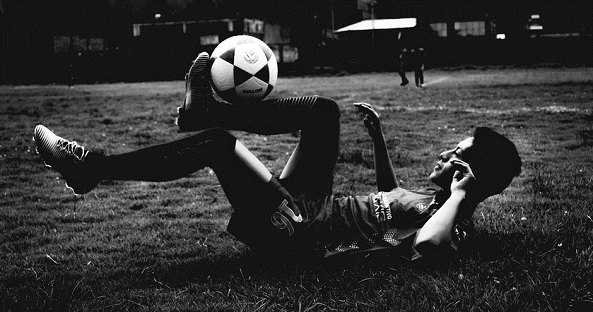
Ongoing COVID-19 social restrictions may jeopardise an already tenuous link between schools and clubs, with the risk that many community sport organisations may face a decrease in new memberships next year. In general, if a student is not playing a given sport in their final year of secondary school, it is less likely they will join a local club when they commence working or tertiary education.

BMC Public Health recently published a study which sought to understand the impact of COVID-19 on youth sport in Australia and the consequences for future youth participation and retention. (You can read the full study here). Among other things, the research explored the challenge in attracting volunteers and participants back into sport, noting that some survey respondents had a “lack of motivation to stay fit during the pandemic and struggled to find the drive to continue practising or training.”

Some media reports have suggested that up to 50% of Auckland’s secondary school students in some areas have “dropped off the radar” during the current lock-down, which (if accurate) not only highlights a serious issue with the education of teenagers in the region, but also suggests community sport clubs may be in danger of losing a connection with at least half of their potential recruits in the coming year.
Sport New Zealand Outlines Requirements For Community Sport ...
On 19 October, Sport New Zealand (as the Government’s crown agency for sport and recreation) outlined the requirements for community sport in accordance with the COVID-19 Public Health Response (Alert Level Requirements) Order (No 12) 2021.

At Alert Level 2, community sport is considered a social gathering and limited to groups of 100 people. When playing contact sport, no physical distancing is needed as long as groups do not exceed 100. Multiple groups of 100 can take part in indoor facilities and outdoor locations as long as they are contained to “defined spaces”. “Defined spaces” indoors must be divided by walls and not share airflow. “Defined spaces” outdoors are classified as being at least 2 metres apart from other defined spaces, or having walls or dividers to separate groups. In addition, public hygiene and contact-tracing requirements also apply.
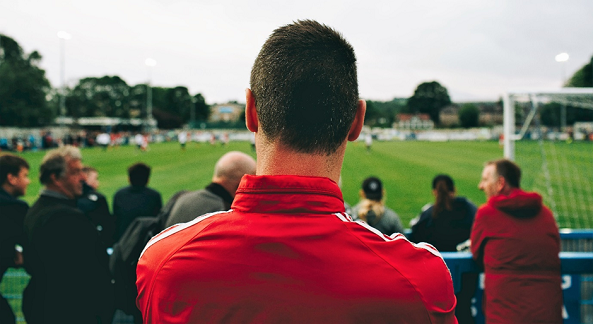
In practical terms, these requirements may create significant obstacles for events such as tournaments played on uncontrolled public grounds or in enclosed arenas where airflow is shared, with event organisers likely to be unable (or unwilling) to undertake or enforce compliance, at the risk of prosecution.
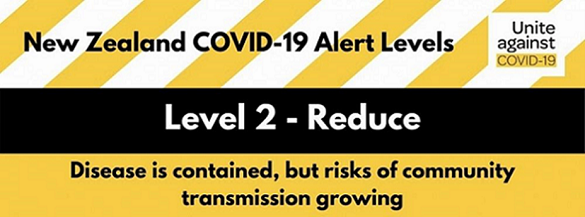
Meanwhile, “Stuff understands several national sports bodies are considering making events or sporting gatherings open only to those who have been vaccinated.” You can read more here. Sport New Zealand says it is developing guidance about the steps that sport and recreation organisations may wish to take to develop their own vaccination policies.
Siberian Orphan Touted As Ron Jarden's Heir ...
In 1929, "a young Pole” by the name of Stanislaw Pietkiewicz created a sensation in Warsaw, by defeating Olympian Paavo Johannes Nurmi (known as "the Flying Finn”), running three kilometres in 8 minutes, 5 seconds. 27 years later and 18,000 kilometres away, in 1956, a Polish war orphan by the name of Bronislaw (Pieter) Pietkiewicz became a champion secondary school sprinter in Wellington, going on to be selected to represent the Wellington Rugby Football Union on the left wing, defending the Ranfurly Shield the following year.
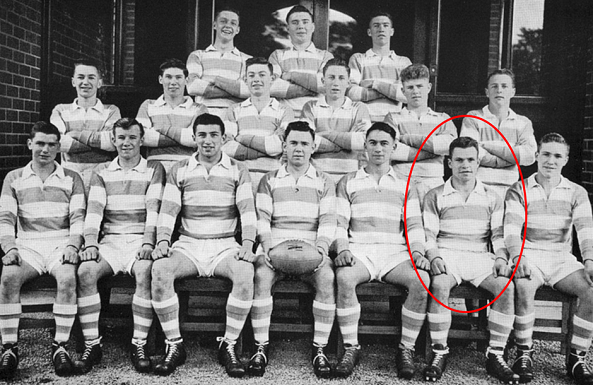
(Bronislaw Pietiewicz, in 1956, at St. Patrick’s College, Silverstream)
Pietkiewicz was introduced to the game of rugby union at the Pahiatua Camp for 733 Polish orphans evacuated from Persia (now Iran), by Frank Muller a school-teacher (and later diplomat), who also played rugby for Wairarapa-Bush. Community sport has played a pivotal role in integrating immigrants to the New Zealand way of life, with rugby union probably the sporting code which has had greatest impact in this regard.
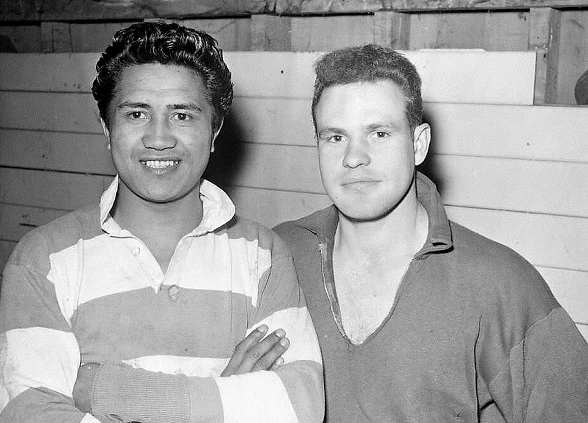
(Jimmy Taitoko and Bronislaw Pietkiewciz, Wellington rugby representatives in 1957)
Pietliewicz’s play was reported to be “strongly reminiscent of that of Ronald Alexander Jarden”. His parents died in the early days of World War Two in Siberia, when he was a few weeks old. Following his evacuation to Persia with his elder brother and sister, Pietkiewicz arrived in New Zealand three years later. He played as a wing in the midget grades in the Pahiatua Camp and in 1947 played in Hawera for the Technical High School, before attending St. Patrick’s College, Silverstream where he was a member of the first fifteen in 1955 and 1956.
In 1957, Pietkiewicz played in the Wellington team alongside his St. Patrick’s College contemporary James David Patrick (“Jimmy”) Taitoko, (Ngati Maniapoto), pictured above. An example of tangata whenua and manene whenua, united in religion, education and sport.
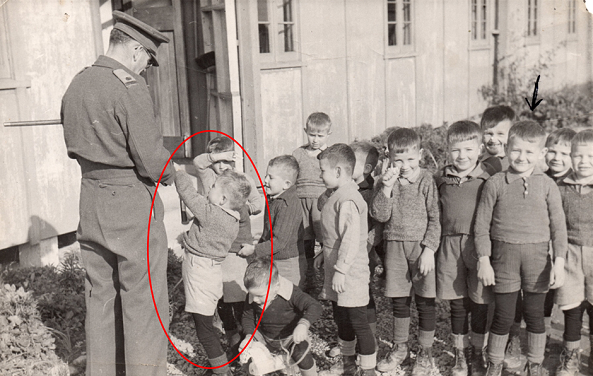
(Bronislaw Pietkiewicz at the Pahiatua Camp for Polish orphans in the 1940’s)
Whether or not Stanislaw and Bronislaw Pietkiewicz were directly related is a matter of conjecture. What is a matter of fact is that rugby union gave Pietkiewicz (and other rugby playing Polish orphans such as “Hustling Hank” Apanowicz, whose name alone suggests a separate story), a sense of belonging and community in a society where amateur sport was a means of bringing people together and building nationhood, “for the love of the game”.
Government Offers $3 Million To Auckland Sport Clubs ...
57% of a “recovery investment” to “help with fixed administration and operating costs” of Auckland-based sport organisations has been announced by Sport and Recreation Minister, Grant Robertson. (You can read more here).
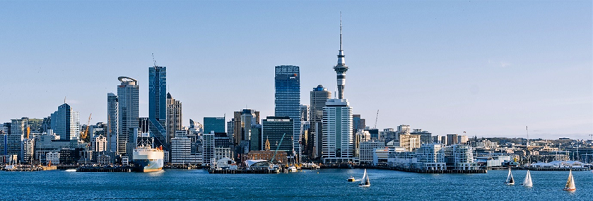
$3 million of a $5.3 million sum is available for community sport clubs to apply for grants. This Association’s database of clubs shows over 1,300 sport clubs in the Auckland region. Based on the available funding pool, $2,200 is potentially available to every club, subject to clubs meeting the application criteria of the Tāmaki Makaurau Sector Support Fund.

A criticism of COVID support funding for sport clubs in the past 18 months, has been the difficulty to access it. To complete a funding application in this case, an Auckland sport club must complete an extensive questionnaire, including: providing a copy of audited financial statements (for applications of $5,000 or more), with an end-date for financial statements submitted of no later than April 2020, (regardless of grant application size).
These requirements alone may deter many applications, particularly from smaller clubs with fewer volunteers or less financial or governance expertise. Firstly, it is not a requirement under law for an incorporated sports entity to have its financial statements audited, unless specified by its Constitution. Secondly (as noted below), the Registrar (since the first lockdown in March 2020) has provided extensions to the requirement for financial statements to be filed, meaning that the "most current" financial statements for many clubs may be earlier than April 2020.

A universal one-off grant to all registered incorporated sport clubs could be an easier and more effective way to direct support funding, or an arrangement with local authorities and utility proviiders to offer a credit for specified costs incurred by registerered incorporated sport clubs (e.g. for rents and basic operating costs such as electricity), could also be a viable option.
Extension To Financial Statement Filing Requirements ...
If your sport club is incorporated, you will be aware of the requirement to file annual financial statements with the Registrar of Incorporated Societies to retain your incorporated status.

(A sport club can request an extension to its regulatory filing deadline)
Particularly for those sport clubs affected by current COVID-19 social restrictions, which may prevent necessary gatherings such as Annual General Meetings to review and approve financial statements, the Registrar of Incorporated Societies has provided a process for clubs to apply for an extension to allow more time to complete this necessary regulatory requirement.
If your sport club needs more time to prepare its financial statements, you can apply to have your filing deadline extended. You can find out more, by clicking here.
From The Archives ...
AMATEUR SPORTS CLUB
AUCKLAND STAR, VOLUME XXIX, ISSUE 253, 26 OCTOBER 1898, PAGE 2
“A meeting of delegates from amateur bodies interested in the formation of an amateur sports club was held in the Metropolitan Hotel last evening at seven o'clock, Mr J. Marshall, in the chair. There was a large and representative attendance at this meeting, all branches of sport being included.The Chairman referred to the Club started in Sydney, which beginning with a membership of 140, had a substantial credit balance at the end of the first year. The rules of this institution were considered suitable for the Auckland club, with a few alterations. On the motion of Mr S. T. George this constitution was adopted, the name fixed on being the “Auckland Amateur Sports Club”.
The bodies given as willing to affiliate were the Rugby Union, Cricket, the Amateur Athletic and Cycle Club, the Swimming Association and Auckland Yacht Club. It was decided that all those present should be foundation members. The election of officers resulted as follows: President, Mr John Marshall; Vice-Presidents, Messrs S. T. George, A. E. Whitaker (President Cricket Association), A. E. T. Devore (President Auckland Rugby Union), F. A. Wiseman (Commodore, Auckland Yacht Club), T. Henderson (Vice-President Auckland Rowing Association).”
John Marshall is recorded as having been born in a cottage on Albert Street in Auckland, in March 1848, the son of Alexander (who originally emigrated to the Bay of Islands in 1838) and Mary. John was educated at the Rev. John Gorrie's Auckland Academy, Lysnar’s Lyceum and Macrae's Grammar School. After his school days, he trained as a solicitor but on his father's death in 1875, he devoted himself to his personal hobbies and the management of the properties which he had inherited. He served on the Auckland City Council for several years, representing the “North Ward”.
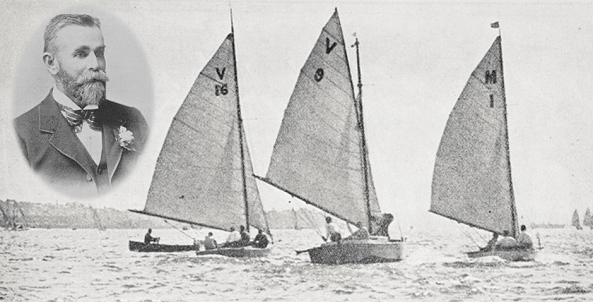
(John Marshall, circled, was a founder of the Auckland Yacht Club)
However, it was as a supporter of all kinds of sport that John Marshall won his chief popularity. He was one of the first exponents of football in New Zealand - (in the form of the game that preceded the adoption of the rugby rules). He was a Life Member and Steward of the Auckland Racing Club and one of the founders of the Auckland Yacht Club..
Of the Auckland Rowing Club he was President for a term of years, and was finally made a Life Member. The City Rowing Club honoured him with the post of Commodore, and he was President of the Auckland Rowing Association. He was also President of the Auckland Swimming Club, and Vice-President for New Zealand. He was President of the Auckland Amateur Athletic Club for some years. Cricket, too, received his support.
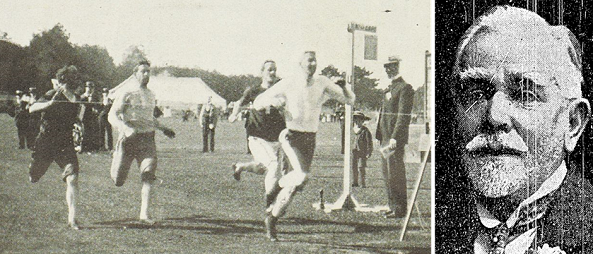
(Marshall was also President of the Auckland Amateur Athletic Club)
As noted in the above article, he formed the Auckland Amateur Sports Club, drafted its rules, and financed it for some months in the early stage of its existence. John Marshall never married and lived his adult life at 146 Remuera Road. He died on New Year’s Day, 1930 in his 82nd year. He is buried in the Presbyterian section of the Waikumete Cemetery.
The Final Word ...
“While history will not foretell what happens next, it may reveal how we will respond.”
(Anonymous)